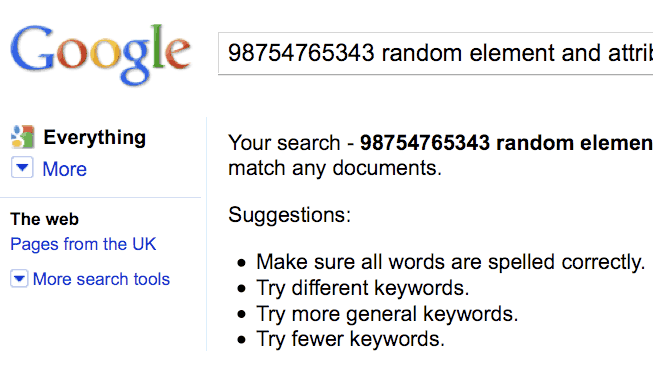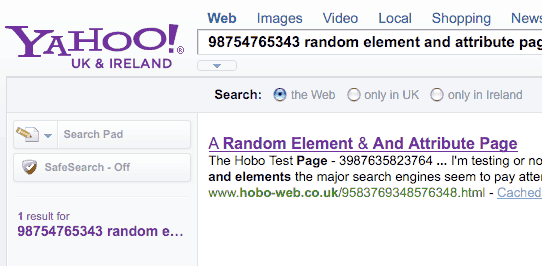If you are a beginner to SEO (search engine optimisation) and want to learn about the basics of SEO, you are in the right place.
This is a beginner’s guide to meta descriptions and meta keywords and offers you an introduction to the basics of Google search engine optimisation.
When it comes to meta tags for Google Search, don’t overthink them.
2023 test
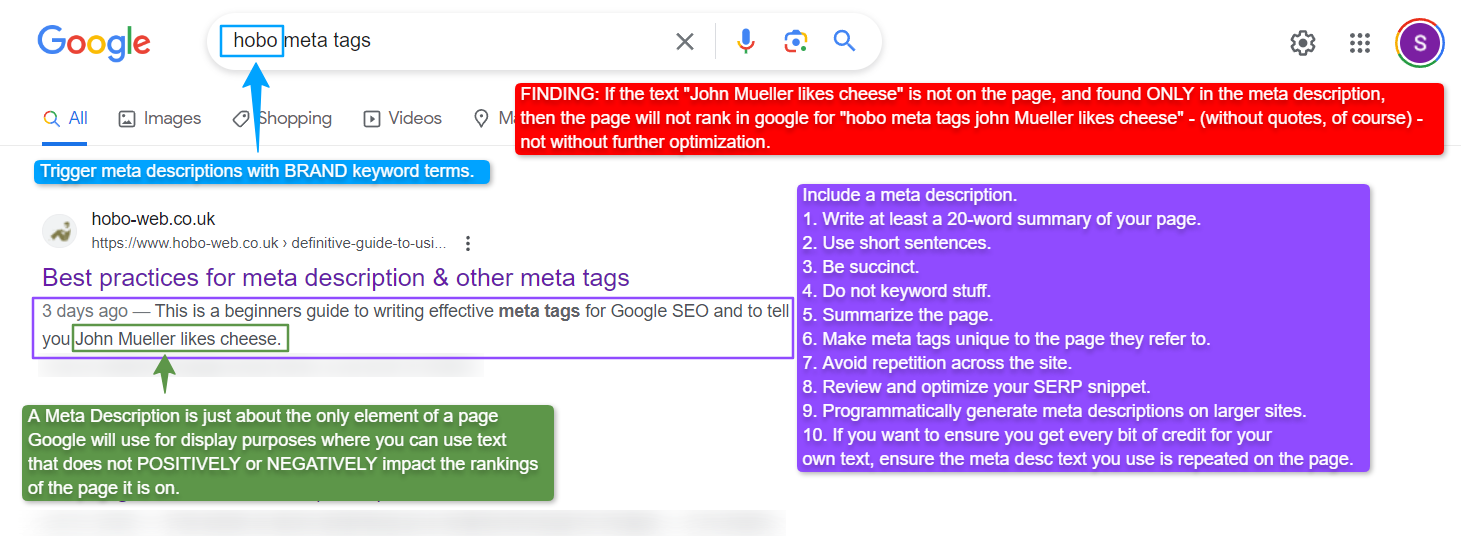
2023 test results
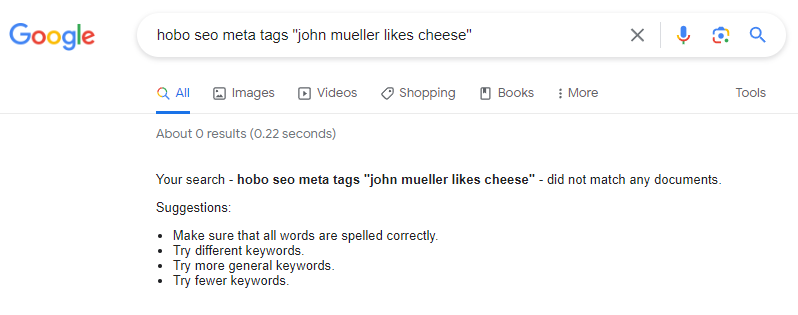
Meta description best practices
- Include a meta description.
- Write at least a 20-word summary of your page.
- Use short sentences.
- Be succinct.
- Do not keyword stuff.
- Summarise the page.
- Make meta tags unique to the page they refer to.
- Avoid repetition across the site.
- Review and optimise your SERP snippet.
- Programmatically generate meta descriptions on larger sites.
- If you want to ensure you get every bit of credit for your own text, ensure the text you use is repeated on the page.
Meta keywords tags best practices
You can safely ignore optimising meta keyword tags for search engines like Google and Bing. Both search engines ignore meta keyword data. They have confirmed it. Tests confirm it. Over many years.
What are meta tags?
Meta Tags are used by Google and other search engines in some not-so-obvious ways.
QUOTE: “Meta tags are a great way for Webmasters to provide search engines with information about their sites. (They) can be used to provide information to all sorts of clients, and each system processes only the meta tags they understand and ignores the rest. (They) are added to the
<head>section of your HTML page.” Google, 2020
Do meta tags help SEO?
Ranking high in Google has far more to do with relevance and reputation of high-quality content, user satisfaction and online popularity than simple meta tag optimisation.
In my experience, most Meta tags do not noticeably influence where a page ranks in Google, in a positive way.
Meta tags, when used properly can still be useful in a number of areas outside just ranking pages e.g. to improve click-through rates from the SERP. Abuse them, and you might fall foul of Google’s punitive quality algorithms.
What are the most important meta tags for SEO?
For the purposes of this ‘beginners guide to meta tags, I focus on the three meta tags I am asked about the most:
- meta description (optional, potentially important for click-through rates and used by Google for display purposes, sometimes)
- meta robots (optional, used by Google)
- meta keywords (optional, ignored by Google and Bing)
Below I share my observations over the years.
Google’s advice about most on-page elements and meta tags is a lot clearer than what it was when I first wrote about this topic (back in 2007!).
Does Google use what is in meta tags for ranking pages?
Some search engines once looked for hidden HTML tags like these to help order pages in search engine results pages, but most search engines have evolved past this, and Google certainly has.
Google is on record as saying it does not use some data in meta when ranking a page (in a positive way) and tests throughout the years have certainly seemed to confirm this.
In short, Google does not use information in the keywords meta tag or the description meta tag to actually rank pages, but it does use the meta description text to create search snippets. Sometimes.
QUOTE: “it’s not the case that changing your descriptions or making them longer or shorter or tweaking them or putting keywords in there will affect your site’s ranking.” John Mueller 2017
What do meta tags do in SEO?
Meta Data can help describe any page in a more convenient machine-readable format, more suited to search engines, but they are very likely to get spammed, and so ultimately limited on their own when it comes to ranking documents on the web.
It is more likely, I think, that Google would look for abuse in such tags and penalise it in some way, rather than reward it.
Google may use metadata, amongst many other signals, to CLASSIFY pages, or DISPLAY information about a page in SERPs, although, in natural results in the UK, I see its impact, where it can be detected, when used at all, being used mainly for DISPLAY purposes.
I look for duplicate boilerplate text in meta descriptions, as they are often a sign of lower-quality pages. I do this because Google says they don’t like that practice – and it is in their guidelines NOT to do it.
Perhaps Google looks at how unique your meta description IS relative to other pages on your site.
Pages are supposed to ‘stand on their own‘ – perhaps algorithms check that they do, and that you are not using low-quality techniques to generate them. I have built tools that can identify doorway pages, for instance, by analysing meta tags – so Google will certainly be able to do even more.
QUOTE: “[Meta Tags] can affect the way that users see your site in the search results and whether or not they actually click through to your site. John Mueller 2017
Do meta tags control your search snippet listing on Google?
Sometimes, yes, at least in the case of the meta description, but not always, and this is dependent on many factors.
Google will pick its own preferred search snippet for SERPs for display purposes, based on elements that can still be influenced by whoever made the page (and site) – and what Google knows about the page.
SERP snippets are based on the user’s query
Keep in mind that there is no guarantee that Google will use the page meta description as the search snippet. The text featured in a Google search snippet is QUERY DEPENDANT and can change depending on the query.
“QUOTE: Keep in mind that we adjust the description based on the user’s query. So if you’re doing a site query and seeing this in your search results for your site that’s not necessarily what a normal user would see when they see a search as well.” John Mueller, Google 2017
and
“QUOTE: We’ve been experimenting with showing longer descriptions in the search results and I believe that’s something that more and more people are seeing. For the descriptions that we show we try to focus on the meta description that you provide on your pages but if we need more information or more context based on the user’s query perhaps then we can take some parts of the page as well. Essentially from a purely technical point of view these descriptions aren’t a ranking for anything. So it’s not the case that changing your descriptions or making them longer or shorter or tweaking them or putting keywords in there will affect your site’s ranking.” John Mueller 2017
The meta description tag is still important from both from a human and search engine perspective, if used intelligently and properly.
QUOTE: “However it can affect the way that users see your site in the search results and whether or not they actually click through to your site. So that’s kind of one one aspect there to keep in mind.” John Mueller 2017
Example Code
<meta name="Description" content="I wouldn't waste 2 minutes optimising my keyword meta tags for Google, but Google tells us to pay attention to meta descriptions." />
If your page is INFORMATIONAL in nature, you can make it relevant to a valuable query you are focused on, but write it for humans, not just search engines. If the keyword phrase you are optimising the page for is found in the meta description, you can usually depend on the meta description showing in Google listings. If the keyword in the search query is NOT present on the page, chances are your meta description WON”T show up.
Although meta descriptions should be UNIQUE – be sensible when manually writing unique meta description text that DOES NOT APPEAR ON THE PAGE – or you are just giving scrapers free text you are not getting any actual rankings benefit from.
Google looks at the description but there is debate whether it actually uses the description tag to rank pages (see tests and observations below). I think they might at some level, or for specific tests, or specific types of pages. From my testing, it is a very weak signal (if any) in INFORMATIONAL SERPs – and this is very reliant on the query. Google certainly indexes meta description for snippet display, not so much for ranking pages, in my observations.
It’s also very important in my opinion to have unique title tags and unique meta descriptions on every page on your site.
I don’t autogenerate descriptions with my cms ON A SMALL SITE – normally I’ll choose to either write a meta description using natural language or omit the tag altogether.
How many characters will Google display as part of a meta description in a SERP snippet?
QUOTE: “Yes. It’s not your imagination. Our snippets on Google have gotten slightly longer…. don’t go expanding your meta description tags. It’s more a dynamic process.” Danny Sullivan, Google Dec 2017
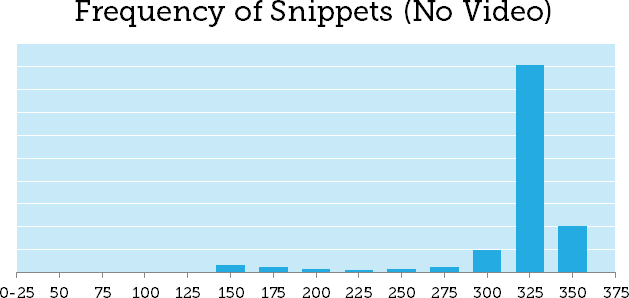
As of December 2017, Google started displaying SERP (search engine result page) snippets with more than 300 characters. A good rule of thumb since then was that you can (if you want) create meta descriptions up to around 300 characters in length if you want the entire message to appear in the Google search page.
Google can change this in future, so I would not invest a whole lot of time in this at the moment. The old limit was about 160 characters.
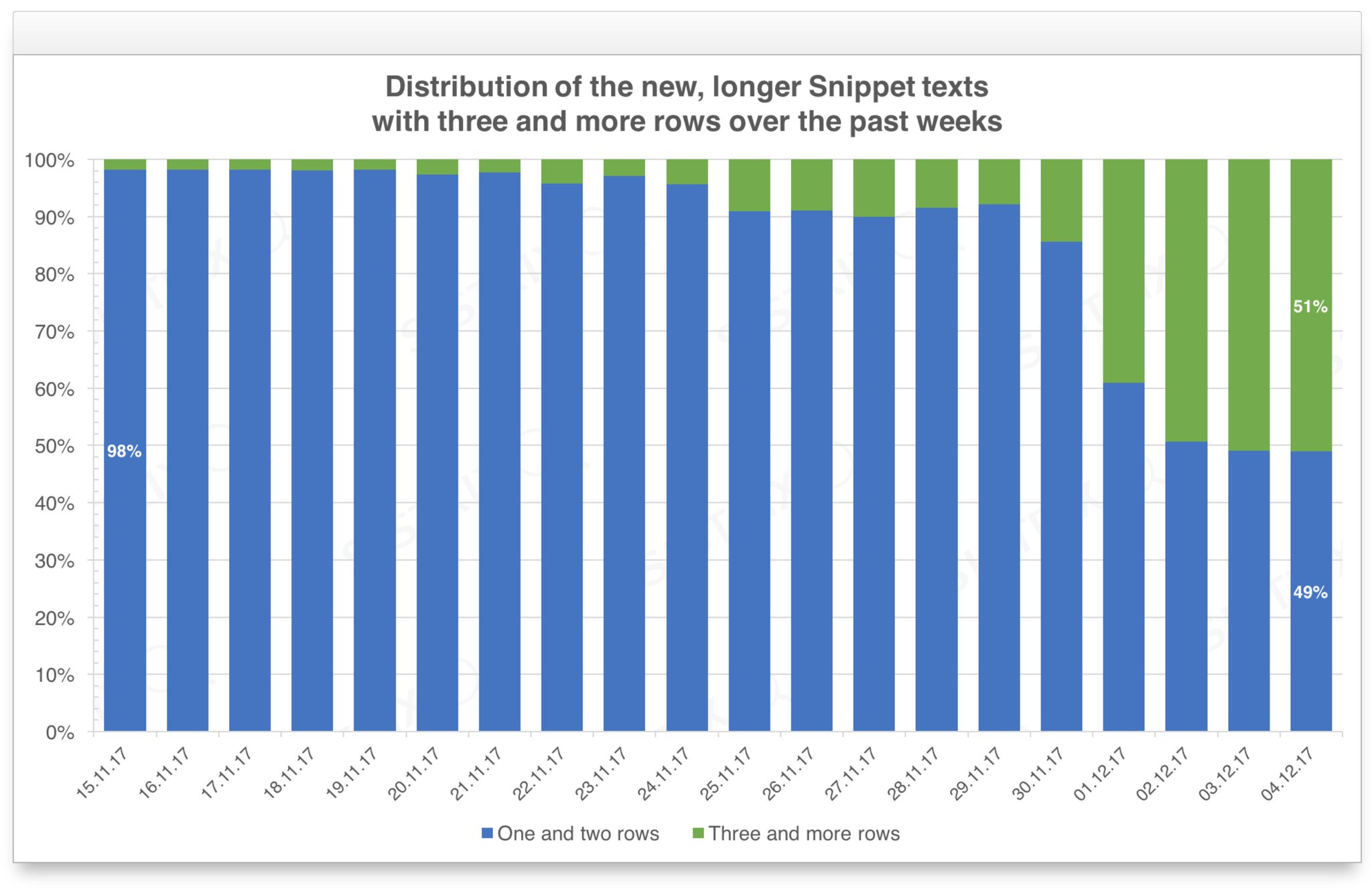
Should I choose a long meta description or a short meta description for my pages?
If you have very short meta descriptions, Google will flag this in Search Console. With a very short meta description, you risk losing valuable real estate on some SERPs. With very long meta descriptions, you risk Google truncating carefully crafted messages you place in this meta tag.
Google also changes frequently how many characters they display in SERPs across devices, and it is never guaranteed they will even use the meta description anyway.
In the video above from 2017, John Mueller was asked “Would you recommend expanding the Meta Description?” to meet Google’s new 300+ character limit for search snippets:
QUOTE: “we’ve always been experimenting with the snippet link and sometimes we show more sometimes we show less and that’s something that I think is sometimes a bit tricky what what I would recommend doing is taking the queries that you see in search console where people are actually searching and trying those out and then seeing what your pages look like with the snippet and if you’re okay with the way they look then that’s fine if you would prefer to have something different there then that’s something that you can change in the Meta Description so it’s not it’s not the case that I would say everyone has to make a long description we show a different snippet depending on the query.” John Mueller, 2017
On the question of optimising meta descriptions, he clarified:
QUOTE: “you kind of have to balance your time and think is it really worthwhile to like go through a hundred thousand pages and write a new description or should I just like keep this in mind when I’m making new pages and not worry so much about this limit of a hundred and sixty characters or whatever it used to be because I think especially when we make changes like this they they tend to go back and forth a little bit until we find the right balance.” John Mueller, 2017
What does Google say about meta descriptions?
QUOTE: “it’s not the case that changing your descriptions or making them longer or shorter or tweaking them or putting keywords in there will affect your site’s ranking.” John Mueller 2017
Google says you can programmatically auto-generate unique meta descriptions based on the content of the page.
Follow Google’s example:
<META NAME="Description" CONTENT="Author: J. K. Rowling, Illustrator: Mary GrandPré, Category: Books, Price: $17.99, Length: 784 pages">
….and their advice on why to do this:
QUOTE: “No duplication, more information, and everything is clearly tagged and separated. No real additional work is required to generate something of this quality: the price and length are the only new data, and they are already displayed on the site.” GOOGLE
Google also says:
QUOTE: “Programmatically generate descriptions
For some sites, like news media sources, generating an accurate and unique description for each page is easy: since each article is hand-written, it takes minimal effort to also add a one-sentence description. For larger database-driven sites, like product aggregators, hand-written descriptions are more difficult. In the latter case, though, programmatic generation of the descriptions can be appropriate and is encouraged — just make sure that your descriptions are not “spammy.” Good descriptions are human-readable and diverse, as we talked about in the first point above. The page-specific data we mentioned in the second point is a good candidate for programmatic generation.
Use quality descriptions
Finally, make sure your descriptions are… descriptive. It’s easy to become lax on the quality of the meta descriptions, since they’re not directly visible in the UI for your site’s visitors. But meta descriptions might be displayed in Google search results — if the description is high enough quality. A little extra work on your meta descriptions can go a long way towards showing a relevant snippet in search results. That’s likely to improve the quality and quantity of your user traffic.” GOOGLE
Can you control what message appears in your Google search snippet?
I always thought if your titles are very spammy (keyword stuffed), your keywords are very spammy, and your meta description is very spammy, Google might stop right there if classifying your page – even big corporations want to save bandwidth at some time.
Google is now on record as saying they tend to ignore spammy meta description tags, for instance:
QUOTE: “Because meta descriptions are usually visible only to search engines and other software, webmasters sometimes forget about them, leaving them completely empty. It’s also common, for the same reason, that the same meta description is used across multiple (and sometimes many) pages. On the flip side, it’s also relatively common that the description is completely off-topic, low quality, or outright spammy. These issues tarnish our users’ search experience, so we prefer to ignore such meta descriptions.” Google 2017
While search engines have much better ways of classifying spam, it’s still worth remembering search engines are always on the lookout for manipulation that goes to far. Bing has publicly stated they look to meta data for signs of manipulation, so you should realise there is probably a degree of risk attached to optimising metadata.
In most organic results I have looked at, putting a keyword in the description won’t take a low-quality page to number 1 or raise you 50 spots in a competitive niche – so why optimise for a search engine when you can optimise for a human? – I think that is much more valuable, especially if you are in the mix already – that is – on page one for your keyword.
An argument to be made is to ALWAYS focus on the USER in INFORMATIONAL listings in Google if you want some semblance of cooperation from Google.
The meta description tag is important at some level in Google, Yahoo and Bing and every other engine listing, and you can use it in multiple ways, but focus on the user, keep it informative and relevant.
Depending on the page in question and time I have to address it, the meta description is rarely a priority for me.
I OFTEN leave out meta descriptions on pages because I think my time is better focused on more important issues on the site, or when I can’t yet decide on one. I often revisit pages to create better descriptions, and I often rely on automatically generating UNIQUE, INFORMATIVE meta descriptions, that Google approves of.
QUOTE: For larger database-driven sites, like product aggregators, hand-written descriptions can be impossible. In the latter case, however, programmatic generation of the descriptions can be appropriate and are encouraged. Good descriptions are human-readable and diverse Google, 2020
If Google has a reason to, it will truncate your meta description for display purposes.
This is the most interesting example Google gives to e-commerce sites:
QUOTE: Include clearly tagged facts in the description. The meta description doesn’t just have to be in sentence format; it’s also a great place to include structured data about the page. For example, news or blog postings can list the author, date of publication, or byline information. This can give potential visitors very relevant information that might not be displayed in the snippet otherwise. Similarly, product pages might have the key bits of information—price, age, manufacturer—scattered throughout a page. A good meta description can bring all this data together. For example, the following meta description provides detailed information about a book.
<meta name="Description" content="Author: A.N. Author, Illustrator: P. Picture, Category: Books, Price: $17.99, Length: 784 pages">
Can I force my meta description to be used by Google?
It is difficult to FORCE Google to do anything with any reliability.
It is possible, but to get, for instance, the meta description to display for a keyword, you generally need the keyword phrase in the meta description. NOTE that if the reason the keyword is in the meta description in the first place is that it is a duplicate of the page title element, then, according to Google’s recommendations – that’s not ideal – and perhaps even unnecessary duplication.
I pay very close attention to what Google says these days, especially after the May 2015 Google Quality Update and other site quality updates, like Google Panda, that Google may be using to rank your site.
Just because it is possible to influence if your meta description appears – doesn’t mean you should do it if it duplicates text in the title element. That advice is direct from Google.
QUOTE: “Google’s generation of page titles and descriptions (or “snippets”) is completely automated and takes into account both the content of a page as well as references to it that appear on the web. The goal of the snippet and title is to best represent and describe each result and explain how it relates to the user’s query.” Google, 2020
Over the last few years, a page title tag (which is not a meta tag and actually called the Page Title Element) could be relied on to provide the ‘title’ of a search snippet in Google, and the meta description (if the keyword phrase was present) often provided the snippet description of the page, making it relatively easy to construct a message in Google listings.
e.g.

Google has radically changed how it creates page snippets, both to improve user experience and to obfuscate how it works as a search engine.
There are still plenty of things you can do to ‘draw attention’ to your page snippet but be careful using ‘stars’ or other special characters – if you ‘stick out’ like a sore thumb – that’s not really what Google is intending. Stick out with your call to action in the text – don’t rely on glitches.
I think that long-term Google would want any guaranteed ‘manipulation’ of a search message in SERPs to be a benefit of its paid AdWords scheme, rather than it’s organic results. It doesn’t want SEO doing that….. not outside of Schema.org mark-up.
Google no longer requires information in various tags to rank or display pages, relying increasingly more on newer signals to both rank and display pages in SERPs.
Meta description SEO tests & observations
While I usually focus mainly on the human user when creating meta descriptions, I’ve spent a lot of time making observations, taking notes and infrequently testing if there was an opportunity when it comes to everything to do with SEO, including on-page elements, and including metadata, and including the meta description.
Does every page need a meta description?
Google says:
QUOTE: “Make sure that every page on your site has a meta description.” Google
A good meta description may be another sign of a quality page, and that can only be a good thing.
Can pages still rank high without a meta description?
Yes. Google is usually able to extract a relevant snippet from the page which you can then go back and optimise for click-through rates if you think of a better message you want to display in SERPs for that page.
NOTE: Google tells you to use a meta description on pages rather than leave it out, so I would listen to them on this point.
Does Google use the meta description when ranking a page?
This is a typical question I was often asked, and as I always liked to back up my recommendations with at least some individual observations to back it up, I often tested to see if I could get a definitive answer.
A lot of people use gibberish words in tests so I didn’t. I always used unique numbers that only appear in hidden elements – and I have a lot of pages all over the place. I am only interested in what I can see and what actually helps a page rank in SERPs.
Using numbers has usually made this observation easy to replicate.
The simple test page I used for educational purposes is still live (but compromised today).
My test page was, and still is, returned as No1 for the keyword search.
I have a unique number in the meta description which is not on the page.
Back in 2010, If I searched for – “THE NUMBER” + “THE QUERY” I got no results – Google says there was no single page in its index with those 2 terms on the page, even though there was.
The result is different today, with Google returning the page – but I think that is either compromised or due to better obfuscation at Google’s end.
These tests were running (in that the page was live) for years and at least in this qualitative test, it certainly appeared as if:
- Google ignored the meta description when ranking the page for the query – if keywords are only in the meta description and not on the page, the page gets NO Benefit in a real-world search.
Google knew it was there – you can check that using the info: operator with the same “THE NUMBER” + “THE QUERY” search and it’s clearly visible in the SERPs when the page IS returned.
BUT – AT THE TIME OF TESTING – Words in the meta description were not used to help rank a page in any noticeable way.
Does Bing Use The Meta Description When Ranking A Page?
It did not return the page. Bing seemed to work the same as Google – effectively ignoring the meta description tag according to this test.
Takeaways from testing
- Google ignores the meta description when the keyword is not also present on the page – which kinds of suggests Google ignores the meta description WHEN RETURNING A BASIC SEARCH RESULT TO A USER.
- Google still reads the meta description and uses it in snippets if you are using certain operators – if you want the meta description to appear as the snippet, place your keyword in it (and that keyword needs to be on the page, too).
- Yahoo did seem to use the meta description still when returning a page in this manner (although I haven’t tested this in a while)
- Bing is similar to Google – it does not apparently use keywords in the meta description that are not on the page (when scoring the relevance of documents)
Challenges with manually writing a unique meta description for every page
NB – Note that these tests will probably be polluted, by now.
Google has said for years “create unique meta descriptions”. If you follow that advice to the letter – you also conveniently give somebody else free text for their spam site.
A good unique meta description only increases the click-through rate if the page actually appears at all for the query.
However, you never get the benefit of a unique meta description that ONLY appears in your meta description and is not duplicated somewhere else on your page, or on the site.
For example:
My unique meta description for that page:
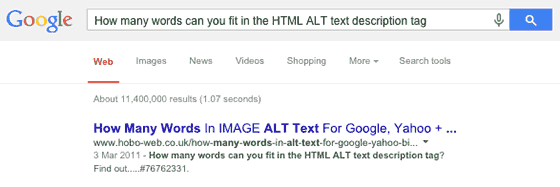
Looks like I am getting the benefit. I am number 1 out of 11 million results. Google does its job – but that’s other page metrics that Google looks at, that can successfully return my page as the originator of that text string – but only because my PAGE TEXT copy has VERY high relevance for that particular query.
It has nothing to do with the meta description.
Let’s try that with that number I have in the meta:
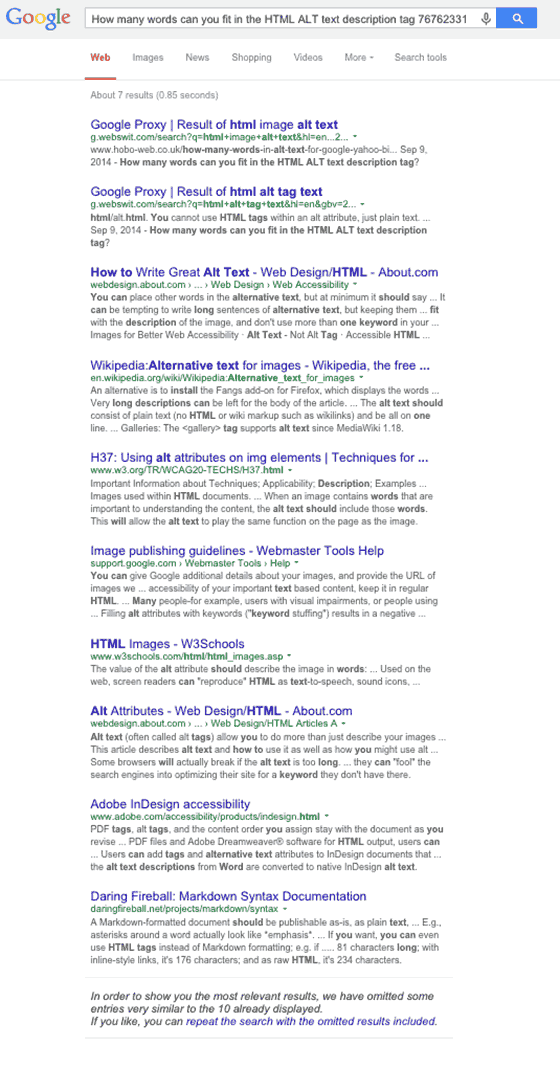
Because I don’t have that number (word) on the actual visible page – I’m all of a sudden, not the most ‘relevant’.
A scraper – who HAS put my content on the page – is more ‘relevant’!
Let’s try it with QUOTES so I can see if I am getting an exact match benefit….
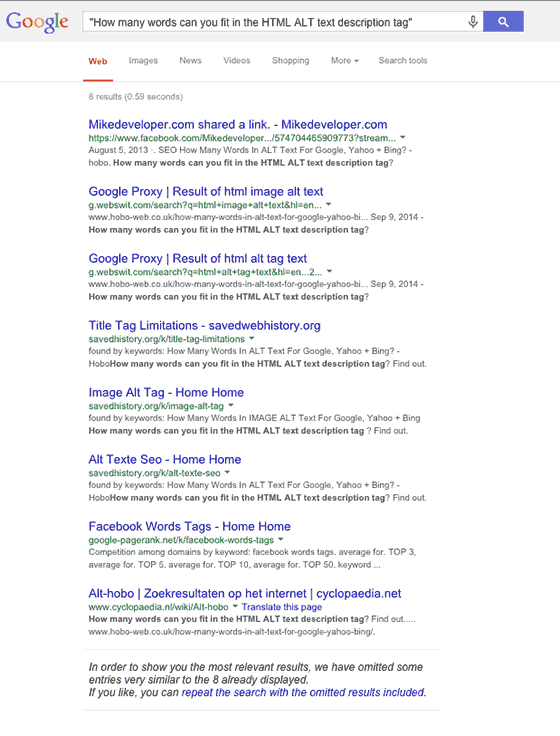
Nope. Nowhere.
Plenty of scrapers getting credit for something that ‘I’ wrote – because that EXACT PHRASE is not in my copy.
Basically – Google cares about who has got the text in the VISIBLE part of the page – not who published this piece of text, first.
TIP? If you are creating meta descriptions – find a way to work them exactly into the visible page copy, too. Or only scrapers benefit.
PS
It’s interesting to see Google totally fail (if I expected my meta description to count for anything):
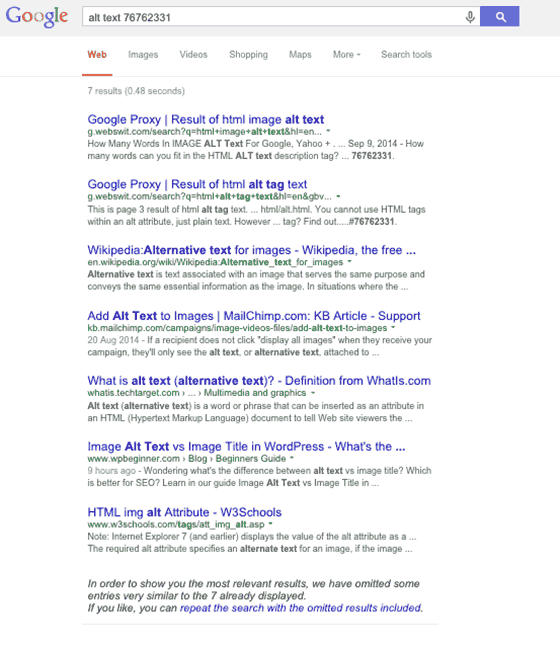
….and then ‘almost’ succeed (because it now has my ‘Hobo’ term relevance and lots of text content to help it) but still, 100% fail on returning the original page top. The scraper that puts it on the visible page text – when I don’t – wins again.
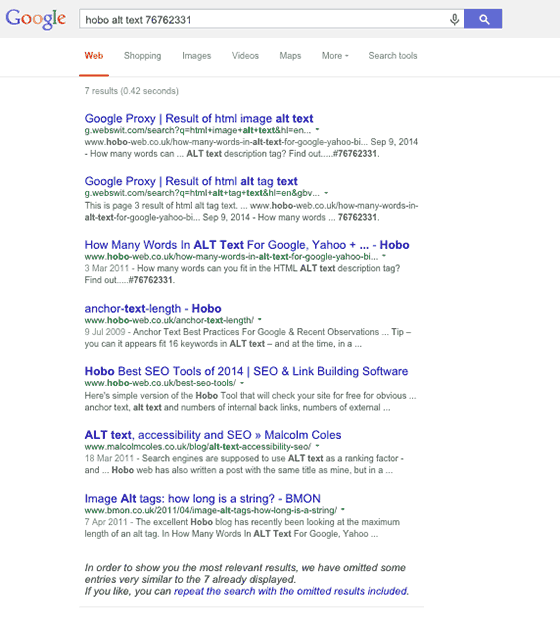
PS My friend Rishi has an interesting observation about the meta description – but I think Google are simply pattern matching on rendering results pages to produce bolding in the SERPs if a high relevance is already detected.
Where you put punctuation in a meta also can impact how it displays (or it has – over the years).
Google fails on some of these searches because of the importance it gives to VISIBLE page content the relative unimportance it gives to INVISIBLE meta descriptions. I *think* i can understand a little WHY it would work this way but still….
Adding unique meta descriptions with text that does not appear on the page just give scrapers free original text to publish.
Scrape your own page for meta descriptions before scrapers do it for you, or leave them out altogether. I saw a page recently where my SERP snippet was HUGE – much bigger than everyone else’s – guess what – I had no meta description tag on the page. I’ll try and remember what search it was and grab a screenshot.
Is the meta description an overall ‘page quality signal’?
Possibly. If it is, the impact on actual rankings is negligible. I have zero evidence it is a page quality signal.
Meta Keywords SEO Best Practice
QUOTE: “But if you’re looking at the keyword meta tags, we really don’t use that at all.” Matt Cutts, Google, 2009
Google is very clear about meta keywords (or keyword meta tags) – they don’t use them:
Example Code Use
<meta name="Keywords" content="SEO, search engine optimisation, optimization" /
In all the years I’ve been testing, Google ignores keywords in meta keywords. Google has also confirmed they ignore meta keywords. You can safely ignore optimising meta keywords across a site. I often remove them from a site, too.
If you are relying on meta-keyword optimisation to rank for terms, you are dead in the water. Before Google confirmed it didn’t look at meta keywords – SEO like myself had to test and make observations to find out. Google generally clarifies only common knowledge in professional circles.
From what I tested, Google + Bing ignored meta keywords for years – or at least places no weight on them to rank pages. Yahoo may have read them, but really, an SEO has more important things to focus time on.
I’ve seen OPs in forums ponder which is the best way to write these tags – with commas, with spaces, limiting to how many characters, how many words to use… but sensible advice would be to spend your time on other things.
QUOTE: “The meta keyword tag is dead in terms of SEO value for @BingWMC. We exclude it and ignore it.” Christi Olson, Bing, 2020
If you spam meta keywords, you’ve just told Google by the first lines of code on your page what to penalise the page for if manipulation is detected – that’s what I always thought – and BING confirmed they did do this. While Meta name=”Keywords” was originally for words that weren’t actually on the page that would help classify the document, I’d be wary of stuffing keywords in any element of a page.
QUOTE: “You’re right in that we generally ignore the contents of the ‘keywords’ meta tag. As with other possible meta tags, feel free to place it on your pages if you can use it for other purposes – it won’t count against you.” John Mueller, Google – Comment (now removed) From 2009
Meta Keywords SEO Tests & Observations
From my tests over the years, Google (and Bing) ignored the keywords in the Meta Keywords Tag, but Yahoo Still used them when ranking pages.
Using the same methodology as my previous observations, it’s clear (and unsurprising) Google and Bing 100% ignore keyword meta keywords when ranking a page on a keyword search.
In the past, in Google, the test page in question disappeared if I added the unique keyword in the meta keyword tags to the same query (if it is not on the page and only in the meta keywords tag).
So – it appeared there was no benefit of having a keyword in the meta keywords tag on this level, for Google, if it is not on the page.
Bing seemed to work in a similar fashion to Google, however, Yahoo clearly apparently still used the meta tag for ranking purposes as the following image showed…
Google is much better at obfuscating how it works under the hood, but it seems to me to work in much the same way as it has always done (in some areas).
It’s just harder to use Google to show it.
I think it can do more harm than good to optimise meta keywords, in terms of possibly spamming, giving away business knowledge, or wasting time spent better elsewhere.
Search engines understand the text, best, and Google, at any rate, is MOSTLY interested in VISIBLE PAGE COPY – it calls this MAIN CONTENT OF A PAGE in the quality rater guidelines.
Search engines cannot quite understand graphics or images as well as they can handle text content or other proprietary technologies (don’t build your website with Flash!). Text content is key to accessible website design and search engine optimisation – and any valid attribute offers you an opportunity to add a bit more, relevant and descriptive text about your web page into your web page.
Search engines ignore most invisible elements traditionally spammed s before you even worry about the correct use of meta tags: write relevant text content for your page.
Note: Meta tags are hidden in a document’s source, invisible to the reader. Some search engines, however, are able to include the content of meta tags in results – if they want.
Robots meta tag SEO best practices
Example Code;
<meta name="robots" content="index, nofollow" />
I could use the above meta tag to tell Google to index the page but not to follow any links on the page if, for some reason, I wanted the page indexed but I don’t want to vouch for any of the links on the page.
By default, Googlebot will index a page and follow links to it. So there’s no need to tag pages with content values of INDEX or FOLLOW. GOOGLE
There are various ways you can use a Robots Meta Tag but remember Google by default will index and follow links, so you have no need to include that as a command – you can leave the robots meta out completely – and probably should if you don’t know anything about it.
Googlebot understands any combination of lowercase and uppercase. GOOGLE.
Valid values for Robots Meta Tag “CONTENT” attribute are: “INDEX“, “NOINDEX“, “FOLLOW“, “NOFOLLOW“. Pretty self-explanatory.
Examples:
- META NAME=”ROBOTS” CONTENT=”NOINDEX, FOLLOW”
- META NAME=”ROBOTS” CONTENT=”INDEX, NOFOLLOW”
- META NAME=”ROBOTS” CONTENT=”NOINDEX, NOFOLLOW”
- META NAME=”ROBOTS” CONTENT=”NOARCHIVE”
- META NAME=”GOOGLEBOT” CONTENT=”NOSNIPPET”
Google will understand the following and interprets the following robots meta tag values:
- NOINDEX – prevents the page from being included in the index.
- NOFOLLOW – prevents Googlebot from following any links on the page. (Note that this is different from the link-level NOFOLLOW attribute, which prevents Googlebot from following an individual link.)
- NOARCHIVE – prevents a cached copy of this page from being available in the search results.
- NOSNIPPET – prevents a description from appearing below the page in the search results, as well as prevents caching of the page.
NOODP – blocks the Open Directory Project description of the page from being used in the description that appears below the page in the search results.THIS WAS NO LONGER SUPPORTED from 2017.- NONE – equivalent to “NOINDEX, NOFOLLOW”.
Quick Reference:
| Terms | Googlebot | Slurp | BingBot | Teoma |
|---|---|---|---|---|
| NoIndex | YES | YES | YES | YES |
| NoFollow | YES | YES | YES | YES |
| NoArchive | YES | YES | YES | YES |
| NoSnippet | YES | NO | NO | NO |
| NoODP | NO | YES | YES | NO |
| NoYDIR | NO | YES | NO | NO |
| NoImageIndex | YES | NO | NO | NO |
| NoTranslate | YES | NO | NO | NO |
| Unavailable_After | YES | NO | NO | NO |
I’ve included the robots meta tag in my tutorial as this is one of only a handful of HTML head elements I generally focus on when it comes to Google (and Bing) SEO.
At a page level – it is powerful. When I am optimising a page for Google, I am usually focused on the PAGE CONTENT (MC) and USER EXPERIENCE, and I am usually interested in the following on page elements:
- Title Element – Important – Unique
- Meta Description (optional but advisable in most cases) – Unique
- Robots (optional) – Be Careful
These tags go in the [HEAD] section of an [HTML] page and represent the only tags for Google I really pay attention to. Just about everything else you can put in the [HEAD] of your HTML document is quite unnecessary and maybe even pointless (for Google optimisation, anyway).
Google explicitly says in their guidelines:
QUOTE: “Google will ignore meta tags it doesn’t know” Google Webmaster Guidelines, 2018
How Google treats “noindex,follow” in Robots Meta Tag on pages
It is a misconception in the SEO community that Google handles this as some may think:
QUOTE: “So it’s kind of tricky with noindex. Which I think is something somewhat of a misconception in general with a the SEO community in that with “a noindex and follow it’s still the case that we see the noindex and in the first step we say okay you don’t want this page shown in the search results. We’ll still keep it in our index, we just won’t show it and then we can follow those links.” EDIT – I am adding the quotes EDIT Shaun) But if we see the noindex there for longer than we think this page really doesn’t want to be used in search so we will remove it completely. And then we won’t follow the links anyway. So in noindex and follow is essentially kind of the same as a noindex, nofollow. There’s no really big difference there in the long run.” John Mueller, Google
NOTE:
QUOTE: “noindex, follow” “is essentially kind of the same as a” “noindex, nofollow” John Mueller, Google
and
QUOTE: “if someone were to link that page and you have it set to noindex like well they’re linking to nowhere” John Mueller, Google 2018
Does Google use ODP Robots meta tag?
Open Directory Data Meta Tag Now Deprecated
Google used to use data from the ODP to create snippets, although you can tell Google to NOT use this data using meta tags, and I normally used this tag too.
<meta name="robots" content="NOODP">
To specifically prevent Google from using this information for a page’s description, use the following:
<meta name="googlebot" content="NOODP">
If you use the robot meta tag for other directives, you can combine those.
<meta name=”googlebot” content=”NOODP, nofollow”>
Google no longer follows this meta tag.
QUOTE: “With DMOZ (ODP) closed, we stopped relying on its data and thus the NOODP directive is already no-op.”
Does Google use Geo Meta Tags to rank pages?
No: Google does not use Geo Meta Tags to Rank Pages.
QUOTE: “We don’t use geo meta tags at all for search, probably never have. Use hreflang + normal geotargeting“. John Mueller, Google, 2017
Does Google use Googlebot meta tags to rank pages?
Yes:
<meta name=”googlebot” content=”…, …”>
These meta tags control how search engines crawl and index the page. The “robots” meta tag specifies rules that apply to all search engines, the “googlebot” meta tag specifies rules that apply only to Google. Google understands the following values (when specifying multiple values, separate them with a comma):
- noindex: prevents the page from being indexed (see “Block or remove pages using meta tags“)
- nofollow: don’t follow links from this page when looking for new pages to crawl (also see “Block or remove pages using meta tags“)
- nosnippet: don’t show a snippet of this page when displaying it in the search results (see “Prevent or remove snippets“)
- noarchive: don’t display a “Cached” link for this page in the search results (see “Prevent or remove cached pages“)
- unavailable_after:[date]: remove this page from the search results after the specified date and time (see “Robots Exclusion Protocol: now with even more flexibility“)
The default rule is “index, follow” — this is used if you omit this tag entirely or if you specify content=”all.” Additional information about the “robots” meta tag can be found in “Using the robots meta tag.” As a side-note, you can now also specify this information in the header of your pages using the “X-Robots-Tag” HTTP header directive. This is particularly useful if you wish to fine-tune crawling and indexing of non-HTML files like PDFs, images or other kinds of documents.
Does Google use the ‘notranslate’ meta tag?
Yes:
<meta name=”google” content=”notranslate”>
QUOTE: When we recognize that the contents of a page are not in the language that the user is likely to want to read, we often provide a link in the search results to an automatic translation of your page. In general, this gives you the chance to provide your unique and compelling content to a much larger group of users. However, there may be situations where this is not desired. By using this meta tag, you can signal that you do not wish for Google to provide a link to a translation for this page. This meta tag generally does not influence the ranking of the page for any particular language. More information can be found in the “Google Translate FAQ“.
What does the ‘verify’ meta tag control?
This is a Google Search Console specific meta tag to verify ownership of your site with Google – note that “The “verify-v1” meta tag is an exception, it’s case-sensitive“:
<meta name=”verify-v1″ content=”…”>
QUOTE: This Google webmaster tools-specific meta tag is used on the top-level page of your site to verify ownership of a site in webmaster tools (alternatively you may upload an HTML file to do this). The content value you put into this tag is provided to you in your webmaster tools account. Please note that while the contents of this meta tag (including upper and lower case) must match exactly what is provided to you, it does not matter if you change the tag from XHTML to HTML or if the format of the tag matches the format of your page.”
Google Search Console AKA Webmaster Tools
Google will also look to metadata when connecting your site to Google Webmaster Tools. If you ever need to use this verification method, it’s easy to apply to the HEAD.
Does Google use http-equiv=”Content-Type” meta tags?
<meta http-equiv=”Content-Type” content=”…; charset=…”>
“QUOTE: This meta tag defines the content-type and character set of the page. When using this meta tag, make sure that you surround the value of the content attribute with quotes; otherwise the charset attribute may be interpreted incorrectly. If you decide to use this meta tag, it goes without saying that you should make sure that your content is actually in the specified character set.”<meta http-equiv=”refresh” content=”…;url=…”>“QUOTE: This meta tag sends the user to a new URL after a certain amount of time, sometimes used as a simple form of redirection. This kind of redirect is not supported by all browsers and can be confusing to the user. If you need to change the URL of a page as it is shown in search engine results, we recommended that you use a server-side 301 redirect instead. Additionally, W3C’s “Techniques and Failures for Web Content Accessibility Guidelines 2.0” lists it as being deprecated.
Does Google want metadata code written in lower case or upper case?
Google can read both:
(X)HTML and Capitalization
Google can read both HTML and XHTML-style meta tags (regardless of the code used on the page). In addition, upper or lower case is generally not important in meta tags — we treat <TITLE> and <title> equally. The “verify-v1” meta tag is an exception, it’s case-sensitive
Does Google use Revisit-After meta tag?
No:
revisit-after Sitemap lastmod and changefreq
“Occasionally webmasters needlessly include “revisit-after” to encourage a search engine’s crawl schedule, however this meta tag is largely ignored. If you want to give search engines information about changes in your pages, use and submit an XML sitemap. In this file you can specify the last-modified date and the change-frequency of the URLs on your site.” GOOGLE
What about meta titles?
QUOTE: “To maximise usability across devices, stick to a shorter concise title of between 50-60 characters. Expect Google to count up to 12 words maximum in a title element. There should only be one page title element on a page.” Shaun Anderson, Hobo 2020
NOTE – The Page Title Element is not a meta tag, although it is frequently referred to as one.
Page titles are not classed as meta tags. They are correctly understood as Page Title Elements. Best practices suggest about 1-12 words max in your page titles (with focus keyword phrase present) but NOTE it is probably BEST TO KEEP MOST TITLE TAGS SUCCINCT for usability purposes.
Google uses keywords and key phrases within the Page Title element when scoring the page, and often, but not always, as the title of the page search snippet in SERPs. I like to keep titles to within this and ensure my important keywords are within the first 8 words and about 60 odd characters.
How to write effective meta tags
You can still be creative when thinking about some tags like the Meta Description, but meta tags are best used when EXACTLY describing the page in question, and helping Google to shortcut to information about your page. If you are helping Google serve, especially informational queries, and helping short-cut to data, Google is your friend, and most can still benefit from that relationship.
When used properly Meta Descriptions traditionally helped form the ultra-important ‘hook’ of your advertising in the free SERPs.
Your tags should be accurate, relevant and descriptive, and be careful focusing them all unnecessarily on just one keyword, but don’t think ‘meta tags’ until you have thought about what the ‘topic‘ and ‘concept‘ of a page is, its ‘purpose‘ and end ‘user experience’.
Satisfying all is key to building a reputation, in Google, and on social channels. If you are optimising for Google, don’t think page or article, think ‘topic’ or ‘subject’ or information ‘hub’. Google aims to return rich, informative editorial pages in LOTS of organic results in future – that trend is evident in some niches.
All major search engines recommend the sensible use of metadata and if you’re writing useful, descriptive tags it will be unlikely any major search engine will penalise proper use – when no low-quality shortcuts are taken, at least.
Most search engines use or have used meta-information in some way to help classify a document, but just because a search engine ‘uses’ meta-description tags, for instance, doesn’t mean they are using it as a positive ranking signal where your page ranks in the SERPs.
External References
- http://googlewebmastercentral.blogspot.co.uk/2007/03/using-robots-meta-tag.html
- http://www.robotstxt.org/meta.html
- http://googleblog.blogspot.co.uk/2007/02/robots-exclusion-protocol.html
- https://support.google.com/webmasters/answer/79812?hl=en
- https://support.google.com/webmasters/answer/35624?hl=en
- https://webmasters.googleblog.com/2007/12/answering-more-popular-picks-meta-tags.html

